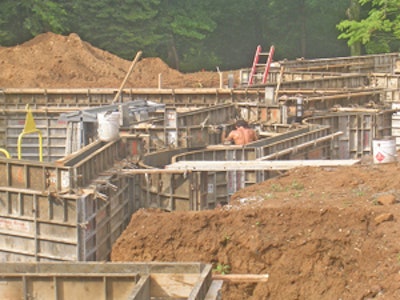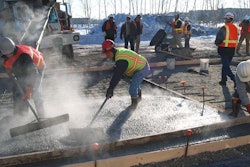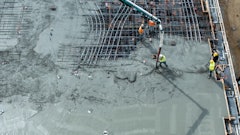
Gone are the days when residential construction consisted of deep-seated relationships between local firms. The housing industry has changed dramatically as large home building companies have expanded in number, size and geography. This has led to bigger, more powerful companies dictating the terms of work, which requires today's poured wall foundation contractors to adapt to these changing market conditions. Understanding the changing dynamics of residential construction and being willing to alter your business to accommodate them will be essential for future success.
Changing times
Our firm, MPW Construction Services of Wellington, Ohio (near Cleveland) first began to see the emergence of powerful home building companies, based outside of our area but building here, in the 1990s. While companies doing billions of dollars in residential construction had been in business for years before this, our market was not the prime target for these "mega-builders." This was primarily due to the fact that our region was not growing; housing starts were steady but below 10,000 units per year.
Large building companies are known for their aggressive growth plans. Any market above a certain threshold of permits — an amount that will justify the investment required to provide a return to the company — is a market of interest. By the 1990s, the Cleveland market was large enough to justify attention. During the past 12 years, the percentage of homes constructed by mega-builders in our market has increased from none to around 35 percent. Given these numbers, it is not surprising that we have had to adjust our business practices and build relationships with these companies.
Effects on contractors
While some may be quick to judge this change in the market as negative, we view it as an opportunity to develop solutions that benefit our business and industry. For example, this paradigm shift has forced "old school" companies like ours to focus relentlessly on costs, efficiency and customer satisfaction — or risk failure. As the result of this focus, we have improved our processes and developed more sophisticated systems for understanding our own business. While often painful, these changes should be characterized as positive.
Although the core of our business has remained the same — building poured wall foundations — virtually no facet of our business has remained unaffected. Everything from our culture to our collections process has been modified, largely in response to the relationships with these mega-builders. Large builders have high expectations and sophisticated systems that dictate the performance of the subcontractor. Therefore, we had to adapt our systems and attitudes to satisfy these expectations.
While this may sound easy, we discovered it meant significant changes that required adjustments not only in attitude but also in business practices. We have found that today's business more often involves detailed scopes of work, contracts and purchase orders as well as other detailed reports and tracking devices. Additionally, pricing negotiations are completely different. It is not uncommon to work on a small price issue for weeks or longer without satisfactory resolution. Further, the powerful processes and guidelines that companies bring to our relationship absolutely mandate that we focus on keeping our costs and prices low. We often find ourselves at a disadvantage dealing with the relentless corporate cost-cutting culture of the mega-builder; however, adapting to these realities is critical for the contractor's success.
Creating success
Developing strong relationships with the large builder's local management is a critical factor for success. In the past, we may have nurtured relationships that lasted for decades with a local builder. The national builder representative must operate far less on personality and relationship in order to satisfy the corporate office and shareholders. In the end, you may be the company they want to work with, but if your price is not extremely competitive, you will probably not be the contractor chosen for the job. Understanding this and developing your own business strategy with this information in mind will minimize frustration and wasted energy. Working for mega-builders is truly all about business.
Although the final decision will ultimately be about our price, the mega-builder may be willing to hire, for a slightly higher price, the contractor who demonstrates true added value to the relationship. Specific suggestions you promote about construction methods, new technology or beneficial scope of work changes may result in your company having a leg up on the competition.
It may be difficult to get this kind of information to the right person, so understanding the chain of command is always important.
A real resource for the foundation contractor is the Concrete Foundations Association (CFA) — an international association dedicated to improving the quality and acceptance of cast-in-place concrete foundations. In addition to providing technical support, the CFA provides an excellent forum for foundation contractors to network with each other to learn how others have successfully cultivated strong working environments with mega-builders.
Some dangers
While bringing better business habits to small companies (the foundation contractor) is good for everyone, including the home-owner who benefits from stable pricing, some danger exists to our individual businesses and potentially the industry. Relentless cost-cutting mandates have a diminishing return in our business. We cannot control the price of our commodity (cement and aggregates), nor can we push labor costs down by outsourcing or offshoring. As the mega-builder increasingly dictates price levels (and thereby margin), qualified, professional foundation contractors may begin to wonder if the intense capital requirements, high labor costs and overall risk are adequately balanced by potential return.
Of course, all contractors are free agents. The builder can accurately claim that we come to them of our own volition. However, it is also a fact that as fewer customers make up a larger part of the foundation contractor's portfolio, each one is more important to the contractor's business. The mega-builder becomes exceedingly important to the contractor over time.
Changes are most definitely occurring in our industry, but change is not synonymous with bad. Foundation contractors should seize this opportunity to improve their business processes and diversify their offering to grow their client base. By improving our systems and processes we may solidify our futures and open new doors of opportunity.



















